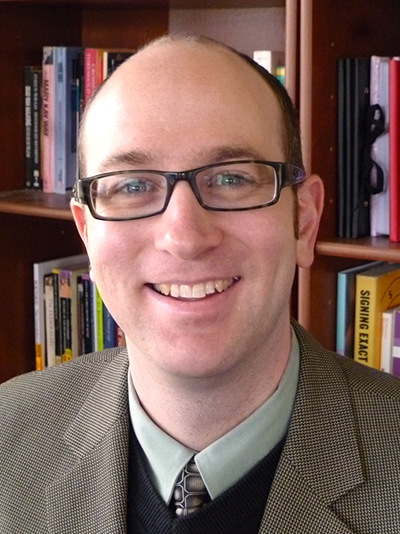 Menu
Menu

The Confraternity of Christian Doctrine recently awarded Associate Professor of Theology Andrew Glicksman, Ph.D., BA ’02, a $25,000 fellowship for his work to help promote Catholic biblical literacy and interpretation. The CCD works with the Catholic Biblical Association to offer these grants.
"These projects will advance biblical scholarship and support biblical literacy in parishes and classrooms," said Bishop Shelton J. Fabre, bishop of Houma-Thibodaux and member of the CCD-CBA Liaison Committee. Only five awards were given by the CCD in 2019, ranging from $2,500 to $25,000.
With this grant, while on sabbatical during this fall 2019 semester, Glicksman will develop a manuscript on the relationship between wisdom and spirit in the biblical and patristic tradition.
“My project concerns two issues. The first is the relationship between the Holy Spirit and wisdom. While teaching Western Theological Tradition on the UD Rome campus, I noticed that many church fathers specifically identify Jesus, the Son, as divine wisdom, but don’t do the same for the Holy Spirit,” said Glicksman. “They associate the Spirit with wisdom — this makes sense because Paul lists it as one of the Spirit’s gifts in 1 Corinthians 12 — but they don’t identify Him with wisdom to the same degree as the Son (in technical theological language, we would say ‘by appropriation’). This was strange to me since I knew that the ideas of God’s spirit and wisdom were very closely related in the Old Testament, and even identified with one another in the Wisdom of Solomon, a book that is my specialty.”
After doing some initial research, Glicksman found that there are a handful of early church fathers — like Irenaeus of Lyon and Theophilus of Antioch — who do talk about the Holy Spirit as wisdom.
“I’m investigating this further,” said Glicksman. “Why did the identification of the Holy Spirit with wisdom disappear in Trinitarian formulations after the third and fourth centuries? Is there perhaps some basis for identifying (by appropriation) both the Son and the Holy Spirit as wisdom? And if so, what might this mean for Christian worship and living?”
The second issue Glicksman is considering has to do with his methodology and is about biblical interpretation in the church. He is answering the call issued by Pope Benedict XVI (at the time, Cardinal Ratzinger) in his famous 1988 Erasmus lecture, titled “Biblical Interpretation in Crisis,” to work toward a reassessment of the historical critical method and its responsible integration with patristic and medieval interpretation in order to promote a further living out of the church’s living tradition.
“I hope to contribute to this conversation by considering spirit and wisdom from both biblical and patristic perspectives, and if my initial efforts are fruitful, in the future I plan to consider later theologians on this same topic,” explained Glicksman.
He has a book contract with the University of Notre Dame Press and is gearing the book to as broad an academic and theological audience as possible so that it will be accessible to theologians in all fields, not only biblical scholars, as well as to educated non-theologians.
“It should be accessible to our graduate students and upper-level undergraduates,” he said. “I hope that it fosters discussion about how to interpret the Bible in the church and how our understanding of the Trinity impacts the way we live as Christians.”
Glicksman will submit the initial manuscript at the end of the year and hopes that the book will be published by the end of 2020.
“This project is much more than an academic exercise for me,” said Glicksman. “It affects how I pray and live out my Catholic faith. I want to share what I discover with others, especially with the UD community but also beyond.”